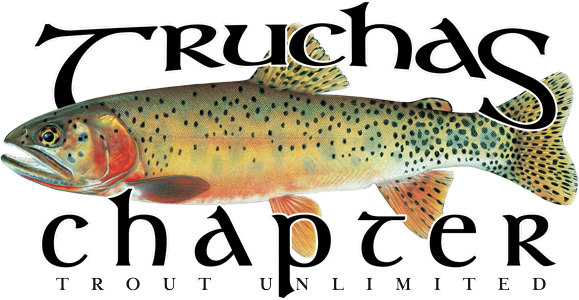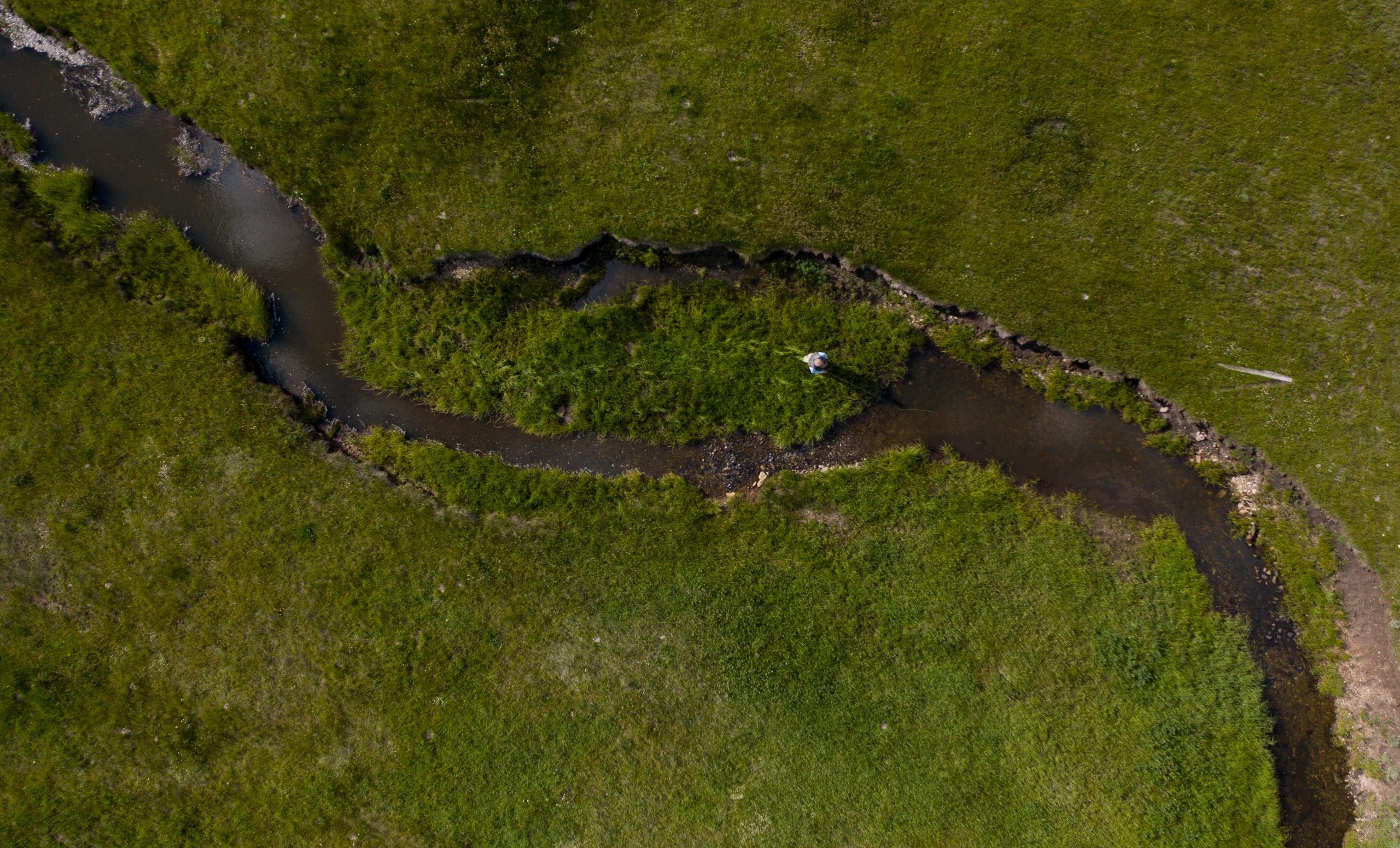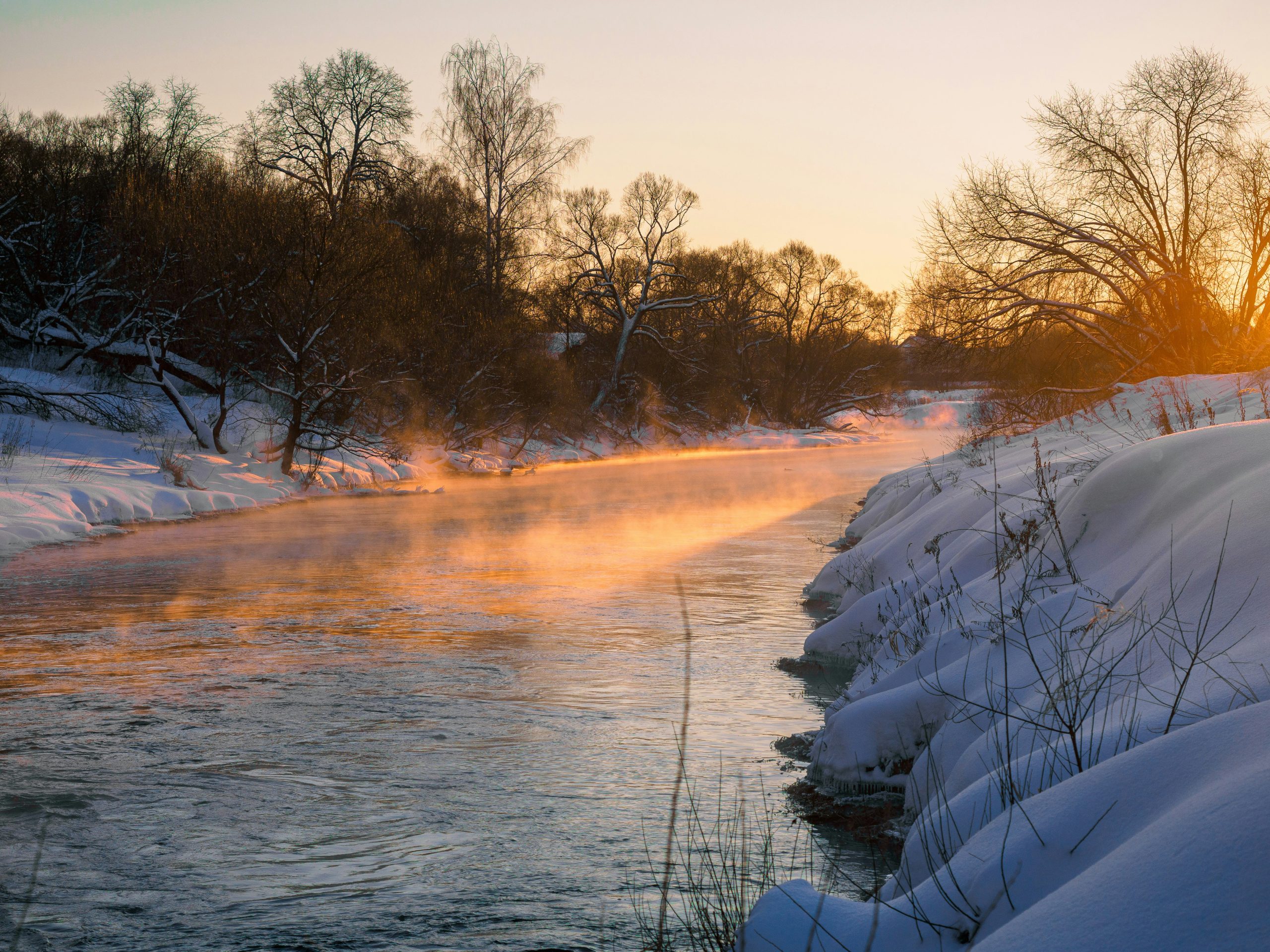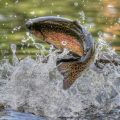While we enjoy fall fishing, some of the most successful fly fishing in Northern New Mexico can occur during the winter months. It is also the favorite time of the year for one of our directors, Boot Pierce, to fish. In this article, he shares his wisdom on winter fly fishing gained through his years as a professional guide.
You would never believe all the funny looks I get when I tell people that my favorite time to fish is right after a freshly fallen snow. I try to explain the quiet beauty of a snow-covered stream bank and the stark whiteness that fills the world. But no one ever believes me, and they just end up asking the same inevitable question… “Isn’t it too cold to fish in the wintertime?”
The greatest thing about fishing during the wintertime is that the streams are deserted, and there is no better place to find peace and solitude. While everyone is home sitting by the fire and watching weekend sporting events, the natural world seems to come alive. Wintertime brings out wildlife that we don’t often see during the crowded summer months. Bald eagles and osprey start flying up and down the rivers, otters become less nocturnal and start to venture out as the crowds subside, and scads of winter birds make the stream bank home.
At the same time, winter is winter, and those great fishing days can turn ugly really fast if you are not prepared. The most important thing to remember when you’re fishing during the wintertime is to stay safe. Cold-weather fly fishing requires extra preparation, planning ahead, and always keeping safety in mind. Here are a few basic tips I’ve learned over the years that I hope you will find helpful as you plan your next cold-weather fishing trip.
Pay attention to that little voice in your head
Listen to what your body and your brain are telling you. If you are getting cold, take a break and go back to the truck to warm up. Sit down on the creek bank and drink some warm coffee from a thermos.
Whatever you do, avoid alcohol. A nip on the creek may sound great, but alcohol expands your blood vessels and, regardless of what your Uncle Elmer told you when you were a kid, it will not warm you up. In addition, it can cloud your decision-making skills, so you may take risks that you normally wouldn’t.
Think ahead and play it safe
Don’t take undue chances while wading. A person can slip and fall into the water any time of the year. In the summertime, we merely hop out of the water, laugh it off, and hope that no one had a video camera to record our clumsiness. But in the wintertime, cold temperatures can quickly turn a simple slip into something deadly.
Don’t get into too much of a hurry, and make sure of your footing as you enter and exit a stream. Also, get a wading stick—they do help.
Fish with a buddy
Whenever possible, always try to fish with a buddy or have someone nearby. If you’re looking for peace and solitude, this may seem counterintuitive, but no one said you had to stand side by side while fishing. Just having someone within shouting distance can mean a lot.
Know what to look for
It helps to recognize the signs of hypothermia and frostbite.
- Hypothermia signs: Shivering is only one indicator. Clumsiness, mumbling or slurred speech, weakness, shallow breathing, and confused thinking are all signs that someone’s body temperature is getting too low. Hypothermia can also lead to risk-taking behavior because it affects self-awareness.
- Frostbite signs: Tingling, red, and numb skin are the first indicators. As blood stops flowing to the skin, it can appear hard and waxy, change to a pale color, and eventually begin to blacken.
If you see signs of either in your fishing buddy, get help immediately.
Dress in layers
Layers are the answer. We hear it all the time, but to stay warm in cold temperatures, dress in multiple layers of wool or synthetic materials like fleece. Breathable and windproof clothes are extremely helpful when fishing in the cold.
Avoid cotton clothing—it retains moisture and takes forever to dry.
Wear a really warm hat
Your old, tattered fishing hat may bring you luck, but during cold weather, you want to wear a really warm hat. A stocking cap or balaclava that covers and protects your ears is crucial.
In recent years, I’ve started wearing a BUFF®-style neck gaiter under my stocking caps. The material isn’t thick, but it works wonders in keeping the cold wind off my neck.
Put on gloves
Warm hands are critical. Nothing is as painful as frostbite on your fingertips. Make sure you have a good pair of gloves—or even better, bring more than one pair, since gloves tend to get wet while fishing.
If you don’t like fishing with gloves, have a towel handy to dry your hands when they get wet. Wet hands mean cold hands.
Warmers everywhere
One trip to the sporting goods store, and you’ll see warmers for almost every body part—hands, toes, even your back. A couple of warmers in your pockets can revive cold fingers between casts.
On really cold days, I’ve even placed hand warmers inside my waders and gloves. When it comes to staying warm, forget what the packet says—get creative.
ALWAYS have a dunk bag
A dunk bag is just a dry set of clothes you can put on in case you fall in and get wet.
It may sound like overkill, but if you fall into freezing water, the first thing you’ll want to do is get dry as soon as possible. Keep a dunk bag in your vehicle or, if you’re floating, in a waterproof container.
Change the way you fish
On really cold days, consider adjusting your fishing style:
- Fish out of the wind when possible.
- Avoid tall bluffs that shade the water—find sunny sections to fish.
- Streamer fishing can be tough in freezing temperatures—stripping a wet fly line all day makes for cold fingers.
- Use barbless hooks and hemostats to remove hooks quickly without getting your hands wet.
Pack your fly vest wisely
A few extra items can make a huge difference when fishing in the cold:
- A waterproof lighter—you never know when you’ll need a fire.
- A space blanket—small, cheap, and easy to pack.
- Extra dry gloves—you can’t go wrong with extra gloves.
Know when to quit
Hopefully, I’ve given you some helpful tips for fishing in cold weather, but the most important thing to know is when to quit.
If you’re cold, no longer having fun, or worried about your safety—QUIT. Get off the water and go warm up.
No fish is worth freezing to death over.



